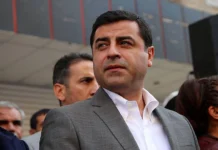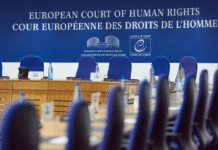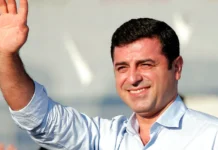
An appeals court has upheld a prison sentence of three-and-a-half years handed down to Selahattin Demirtaş, the jailed former co-leader of the pro-Kurdish Peoples’ Democratic Party (HDP), for insulting Turkish President Recep Tayyip Erdoğan, Turkish Minute reported.
The İstanbul Regional Court of Justice rejected the appeal filed by Demitaş’s lawyers and upheld the prison sentence ordered due to remarks the Kurdish leader made in 2015.
Erdoğan frequently sues or files defamation lawsuits against opposition politicians or journalists criticizing him or his government’s policies.
Thousands of people in Turkey are under investigation, and most of them are under the threat of imprisonment, over alleged insults of President Erdoğan.
The Turkish police and judiciary perceive even the most minor criticism of the president or his government as an insult.
In December 2015 Demirtaş had criticized Erdoğan in a speech, saying the president had “flitted from corridor to corridor” during a conference in Paris, hoping to get a picture taken with Russian President Vladimir Putin.
Those comments came after Turkish forces shot down a Russian warplane that had briefly strayed into Turkish airspace in November 2015, when ties between Ankara and Moscow were at their lowest point since the end of the Cold War.
Demirtaş was an outspoken critic of Turkey’s ruling Justice and Development Party (AKP) and its leader, Erdoğan, before he was jailed. He ran in the presidential elections of 2014 and 2018 as a rival to Erdoğan. The imprisoned leader conducted his election campaign from jail for the 2018 election. He has been behind bars on politically motivated charges since November 2016 despite rulings from the European Court of Human Rights calling for his immediate release.
President Erdoğan and his ally, far-right Nationalist Movement Party (MHP) leader Devlet Bahçeli, frequently accuse the HDP, the second-largest opposition group in parliament, of ties to the outlawed Kurdistan Workers’ Party (PKK).
The PKK is designated as a terrorist group by Turkey, the United States and European Union. It has fought an insurgency against the state in mainly Kurdish southeastern Turkey since 1984. More than 40,000 people have been killed in the conflict.
The HDP denies the government’s claim and says it is working to achieve a peaceful solution to Turkey’s so-called Kurdish problem, a term prevalent in Turkey’s public discourse that refers to the demand for equal rights by the country’s Kurdish population and their struggle for recognition.













